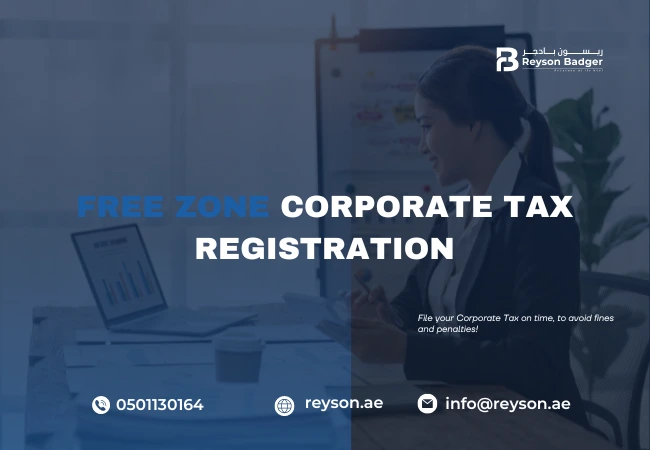
Free zones, also known as free trade zones or special economic zones. Free zones are special areas where businesses can operate with fewer rules and lower taxes. This makes it attractive for companies to set up and grow. Many businesses operate in free zones to take advantage of these benefits. However, the government now requires these businesses to register for Free Zone Corporate Tax Registration. This means they must follow tax rules and pay taxes on their profits. Registering for corporate tax can be complicated, so businesses need help to do it correctly.
.Here, we will discuss the eligibility criteria, process of registration in Free Zone corporate tax, and key considerations along with compliance requirements. Whether you are an entrepreneur, business owner, or financial professional, staying updated about the intricacies of Free Zone corporate tax registration is highly important in terms of retaining your competitiveness and ensuring that your business remains valid in the long run.

Free Zone Corporate Tax is a policy for corporate tax applied to businesses in certain free zones of the country, mainly in the UAE. A free zone is a specialized economic area that offers specific advantages, primarily designed to attract more foreign investments and stimulate economic growth. Usually, companies operating in free zones have special tax benefits.
Many free zones get exemptions for a very large amount of corporate tax relief, but the latest amendment in corporate tax regulation in the UAE would still put some sort of restriction on companies or force them to follow reporting requirements. Companies working in free zones must stay updated with the knowledge of tax laws applicable to their business since income received outside the free zone or within the mainland UAE would be charged with the usual corporate taxes.
What is Free Zone Corporate Tax Registration?
Corporate Tax Registration for Free Zone entities refers to the process of registering a free zone company with the UAE's Federal Tax Authority (FTA) for corporate tax purposes. The purpose of this registration is to ensure that free zone companies comply with the UAE's corporate tax laws and regulations. And ensure that free zone entities with a taxable income exceeding AED 375,000 report their income and pay corporate tax accordingly. This registration enables the FTA to monitor and collect corporate tax from eligible free zone entities, promoting transparency and compliance with UAE tax regulations.
The UAE introduced Corporate Tax in 2023, which applies to all businesses, including free zone companies. The corporate tax rate in the UAE is 9% for taxable income exceeding AED 375,000. Free zone companies are required to register for corporate tax if their annual taxable income exceeds AED 100,000.
Corporate tax Registration for Free Zone businesses refers to the official registration procedure with the tax authority. Upon registration, companies in Free Zones can fulfill their obligations on corporate tax registration and can avoid both sales tax and import duties among other benefits; this provides foreign direct investment into the UAE.
Corporate tax registration is essential because it ensures that businesses are in compliance with legal requirements, report their incomes accurately, and pay all taxes due thereby avoiding penalties. Access to tax benefits and incentives is also obtained. It will help build financial credibility required for growth and attract investors.
Free Zones play a very significant role in the economy of the UAE through means such as creating diversification and jobs and providing the UAE with a hub globally for business. A considerable attraction of foreign investments flows towards areas, such as technology, logistics, and finance sectors that influence trade and fuel the GDP of the nation.
Corporate tax registration provides Free Zone businesses with alignment to the country's changing tax system as they keep in adherence to the country's law. This also avails transparency, accountability, and fair competition by integrating the Free Zone businesses into the larger economic framework as contributing to sustainable growth in the UAE
To be considered a Qualifying Free Zone Person (QFZP) and benefit from the 0% corporate tax rate, a Free Zone Person must meet the following requirements:
Understanding the Main Free Zones for Corporate Tax Registration in UAE
Who Needs to Register for Free Zone Corporate Tax?
The UAE Free Zones businesses need to apply for corporate tax based on the minimum requirements set by the UAE tax authority. These would be considered, such as:
All trading or manufacturing-based businesses: All enterprises incorporated within a Free Zone and incurring revenue will have to register with corporate tax even though they are eligible for tax exemptions or reduced tax rates.
All businesses within Free Zones that carry out taxable activities, receive income from sources outside the UAE, or are in any way touched by the new tax law have to register for corporate tax to exist compliantly within the UAE's tax structure.
Free zone corporate tax registration offers many advantages to the businesses operating in the free zones. Some of the most notable advantages include:
To qualify to start a business in any UAE Free Zone, there are defined qualification requirements. The following are the key considerations regarding the types of businesses that can be registered, the requirements of registration, and the documents required.

To successfully register a business in a Free Zone, the following documents are usually required:
Registration to establish a company in any of the UAE Free Zones is an extremely formalized process. Below are the steps involved in the process from pre-registration procedures to post-registration activities.
In the UAE, Free Zone Persons (FZPs) must calculate corporate tax based on their qualifying and non-qualifying income.
In the context of corporate tax for Free Zone Persons (FZPs) in the UAE, it is essential to distinguish between qualifying income and non-qualifying income:
The tax rates applicable to Free Zone Persons are structured as follows:
Step 1: Determine Taxable Income
Step 2: Apply Corporate Tax Rates
Step 3: Calculate Tax Liability
Step 4: Claim Tax Reliefs (if applicable)
Step 5: Pay Corporate Tax
As per Cabinet Decision No. 10 of 2024, from 1st of March, 2024 the Ministry of Finance, in case of failure to comply with Corporate Tax Registration levies a penalty of AED 10,000.
Relatively favorable business policies in the UAE’s Free Zones offer several advantages, including strategic locations, modern infrastructure, and tax benefits. Free Zones like Dubai Free Zone and JAFZA are particularly attractive to trade, logistics, and technology-based businesses. However, it’s important to note that local laws still apply, and staying compliant requires professional guidance.
To fully benefit from Free Zone incentives, businesses need expert advice to keep up with changing regulations. Reyson Badger, with its deep understanding of Free Zone regulations and corporate tax laws, can help businesses navigate VAT, customs duties, and other legal requirements. This ensures compliance while improving operational efficiency.
If your business is considering registering for Free Zone corporate taxation, now is the perfect time. Contact Reyson Badger for professional consultation and expert assistance in navigating the regulatory environment and maximizing your Free Zone benefits.
FAQs
1. Who needs to register for Corporate Tax in UAE Free Zones?
Answer: All Free Zone companies that have a taxable income exceeding AED 100,000 must register for Corporate Tax in the UAE. This includes companies that are currently exempt from corporate tax.
2. Is Corporate Tax applicable to all Free Zone companies?
Answer: No, Corporate Tax is not applicable to all Free Zone companies. Companies that have a taxable income below AED 100,000 are not required to register for Corporate Tax. Also, some Free Zone companies may be exempt from Corporate Tax, such as those engaged in specific industries or meeting certain conditions.
3. What are the benefits of registering for Corporate Tax in a UAE Free Zone?
Answer: Registering for Corporate Tax in a UAE Free Zone provides several benefits, including compliance with UAE laws and regulations, avoidance of penalties and fines, access to government services and benefits, and enhanced credibility and reputation.
4. Can a Free Zone company with no business operations still be required to register?
Answer: Yes, a Free Zone company with no business operations may still be required to register for Corporate Tax if it has a taxable income exceeding AED 100,000. This includes companies that have income from investments or other sources.
5. What happens if I fail to register for Corporate Tax in a Free Zone?
Answer: Failure to register for Corporate Tax in a Free Zone can result in penalties and fines, as well as potential legal action. Additionally, companies that fail to register may be denied access to government services and benefits.
6. Can Free Zone companies still enjoy the 0% Corporate Tax incentive?
Answer: Yes, Free Zone companies that meet certain conditions may still be eligible for the 0% Corporate Tax incentive. However, companies must register for Corporate Tax and meet the eligibility criteria to qualify for the incentive.